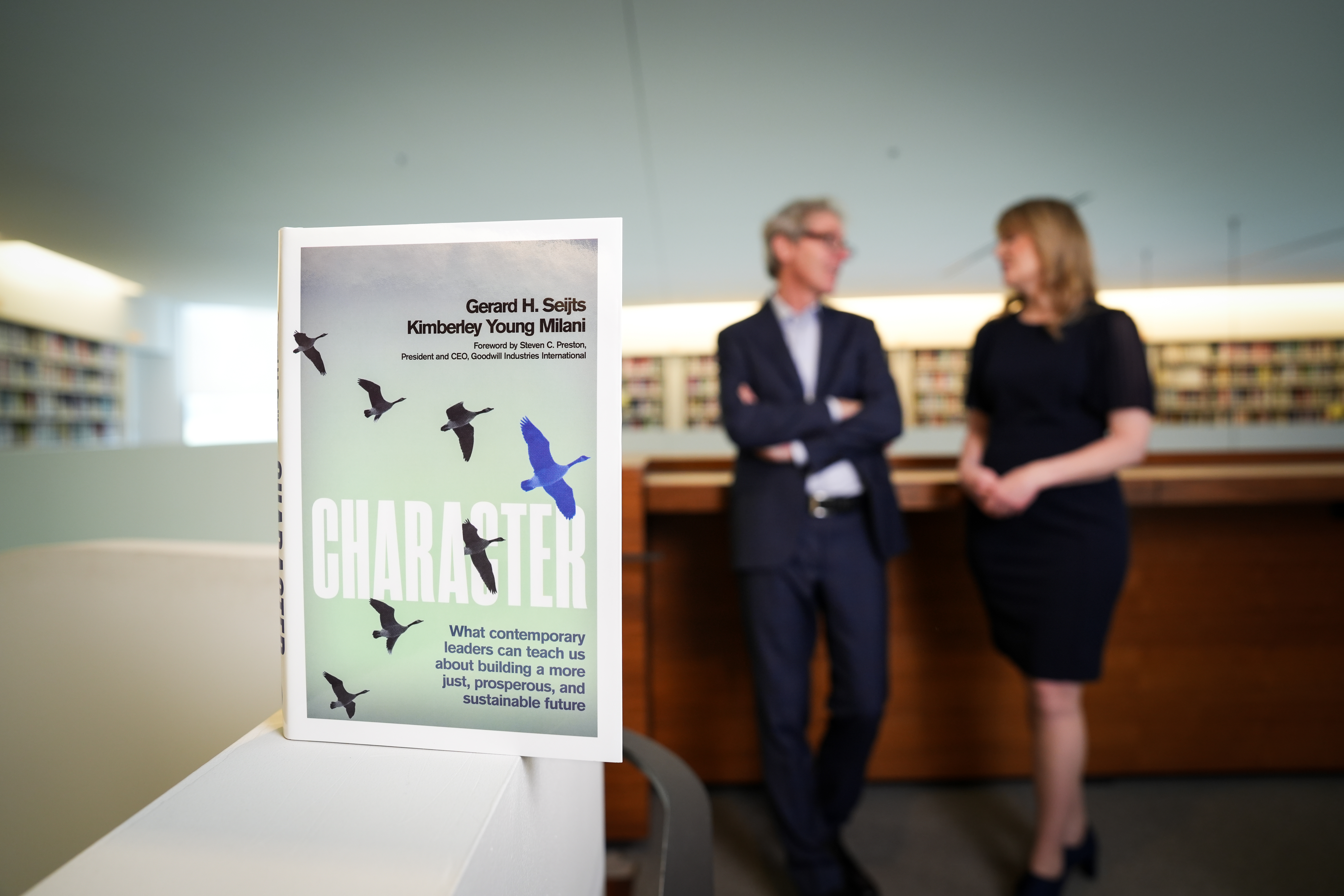How Narratives are Essential to Leadership Character Education

Tell me, what is it you plan to do / With your one wild and precious life?"
— Mary Oliver, The Summer Day
In a short article for the John Templeton Foundation, education and public policy professional Agustín Porres posed the following question: "Does it make sense to educate technically competent citizens without regard to virtues like justice or honesty? Society at large is faced with a very dangerous scenario when citizens are not educated with virtues."
We fully agree with his observation. It is indeed frightening to think of a society capable of doing technically anything, but without the character to consistently do the right thing.
Beginning to Understand Individual Influence
A leader's influence is like a stone dropped in the water, with the concentric circles expanding to impact much more than the initial sphere. It has never been clearer to us that the conscious and deliberate cultivation of character must be included in our personal, educational, and professional development so we may create and become leaders and citizens who are willing and able to tackle the grand challenges of our time, while also judiciously wielding the power that technology has put at our fingertips.
Our purpose in writing our newest book, Character: What Contemporary Leaders Can Teach Us about Building a More Just, Prosperous, and Sustainable Future, is to share inspirational stories from a wide array of leaders who demonstrate character in action: to bring character out of the realm of the abstract and into the realm of the concrete. We have long made a focused and concerted effort to situate character at the heart of leadership through our research, teaching, and outreach. Our aim is to develop leaders and citizens who have strength of character and strive to make a true difference within their spheres – large or small.
Why Storytelling Matters
Stories are one of humanity's most powerful vehicles for understanding who we are – individually and collectively – and to learn from each other's experiences to better understand, and even expand, our own lives. Through the stories in Character, we sought to capture leaders' insights and wisdom so we can learn how to elevate our own character in service of building better leaders, teams and organizations, stronger citizens and communities, and a more flourishing society and world. We also hope individuals will become inspired and called to do this necessary and urgent work.
The leaders we interviewed for our book manifested one or more of the following dimensions of character we identified through research to arrive at sound judgment: accountability, collaboration, courage, drive, humanity, humility, integrity, justice, temperance, and transcendence. The dimension that remains somewhat challenging for people to tangibly grasp is transcendence – which we defined as a sense of wonder; our capacity to be curious, passionate, and visionary; our innate creativity; seeing new possibilities; and having an expansive view that takes into account the breadth and depth of things. We believe that Neil deGrasse Tyson, astrophysicist, author, and science communicator, is an extraordinary role model who exudes these and other leadership qualities in his ongoing efforts to communicate the importance of science to the future of humanity. In our conversation with Tyson, he shared with us a 1974 quote by Apollo 14 astronaut Edgar Mitchell on his experience of spaceflight:
"You develop an instant global consciousness, a people orientation, an intense dissatisfaction with the state of the world, and a compulsion to do something about it. From out there on the moon, international politics look so petty. You want to grab a politician by the scruff of the neck and drag him a quarter of a million miles out and say, 'Look at that, you son of a bitch.'"
Author and space philosopher Frank White subsequently coined this perspective "the overview effect" – a cognitive shift in consciousness reported by some astronauts and cosmonauts during spaceflight that invokes an understanding of the oneness of the world, combined with a sense of wonder and awe, and a feeling of obligation and responsibility to care for the Earth. Tyson harkened to elements of this when he shared with us, "when you see earth from space, adrift in darkness, all you see is ocean, land, and clouds, you don't see the color-coded boundaries that define our maps. And, there is no hint of anyone coming to help us and rescue us from ourselves."
Accountability for Action Falls on Everyone
Indeed … it is up to us. Humans have created the grand challenges we are facing today, and it is our responsibility to engage our transcendence, our humanity, our humility, and our ability to collaborate, to solve them. As stated by Mitchell, "Transcendence gets you beyond ego. If you go beyond ego, you see all of this in a more decent perspective and you can start to put all the pieces together. We haven't done that yet. Not as a civilization."
Tyson returned to this theme in his book Starry Messenger: Cosmic Perspectives on Civilization through which he hopes to stimulate a deeper sense of unity for us all. He offers a challenge in the final chapter:
"Do you know, do you really know, how precious life is? The total number of people who have ever been born is about 100 billion. Yet the genetic code that generates viable versions of us is capable of at least 1030 variations. That astronomically huge number is a one followed by 30 zeros, providing a million-trillion-trillion possible souls ... So far, our branch of the tree of life has produced no more than 0.00000000000000001 percent of all possible humans, forcing the conclusion that most people who could ever exist will never even be conceived. Each of us, for all practical purposes, is unique in the universe – now and forever."
This recognition of our uniqueness was echoed in Character by Colombia University astrophysicist David Kipping, when he stated:
"A collection of atoms is not an unusual phenomenon at all in the universe — you can find them everywhere. But, a collection of atoms that is alive is quite rare! In our solar system, that is clearly true, but it also seems to be true in the greater expanse — in the solar neighborhood around us as well. A collection of atoms that can think, that can talk, that can feel, that can dream, that can have abstract thoughts — that is an extremely rare phenomenon as far as we can tell. I think it is important for us to realize and understand that this experience we are in — of possessing a conscious sense of awareness — is certainly an extremely rare phenomenon. Therefore, so are you and so is each and every one of us."
Just imagine if we were taught to engage in a daily practice – one that ultimately forms our worldview – to acknowledge this objective, scientific truth: that all of us are rare and precious. Imagine if we came to know this, not just cognitively but, collectively, as the foundational understanding of who we are … how would that change the social, technical, economic, and political systems we build and in which we all live?
As Tyson went on to say:
"Being alive is the time to celebrate being alive-every waking moment. Along the way, why not strive to make the world a better place today than yesterday, simply for the privilege of having lived in it .... each of us is alive against stupendous odds. We won the lottery, only once. We get to invoke our faculties of reason to figure out how the world works. But we also get to smell the flowers. We get to bask in divine sunsets and sunrises, and gaze deeply into the night skies they cradle. We get to live, and ultimately die, in this glorious universe."
This is our challenge, and this is where we need to invoke character in addition to our technical competencies to deliver on building a more just, prosperous, and sustainable future. We really have no choice. Stephen Jay Gould, paleontologist, evolutionary biologist, and historian of science, captured it as follows in his book The Flamingo's Smile: Reflections in Natural History:
"We have become, by the power of a glorious evolutionary accident called intelligence, the stewards of life's continuity on earth. We did not ask for this role, but we cannot abjure it. We may not be suited to it, but here we are."
Gerard Seijts is Professor of Organizational Behavior at the Ivey Business School. Kimberley Young Milani is the Director of the Ian O. Ihnatowycz Institute for Leadership at the Ivey Business School. Their new book, Character: What Contemporary Leaders Can Teach Us About Building a More Just, Prosperous, and Sustainable Future, shares research insights on Leader Character and features interviews with individuals who have demonstrated incredible leader character. The book, released on April 30, 2024 is available for order now.
About the Book

The latest book from the Ian O. Ihnatowycz Institute for Leadership provides an exceptional opportunity to become a better leader by applying the extraordinary yet down-to-earth insights from the authors’, Gerard Seijts and Kimberly Young Milani, accessible scholarship and interviews with truly distinguished leaders whose lessons on building stronger societies through character-based leadership are moving, powerful, and evergreen.
Rated Amazon's #1 Best Seller in Business Ethics, you can order your copy of Character: What Contemporary Leaders Can Teach Us About Building a More Just, Prosperous, and Sustainable Future:





 Give us a call 1.800.948.8548
Give us a call 1.800.948.8548




